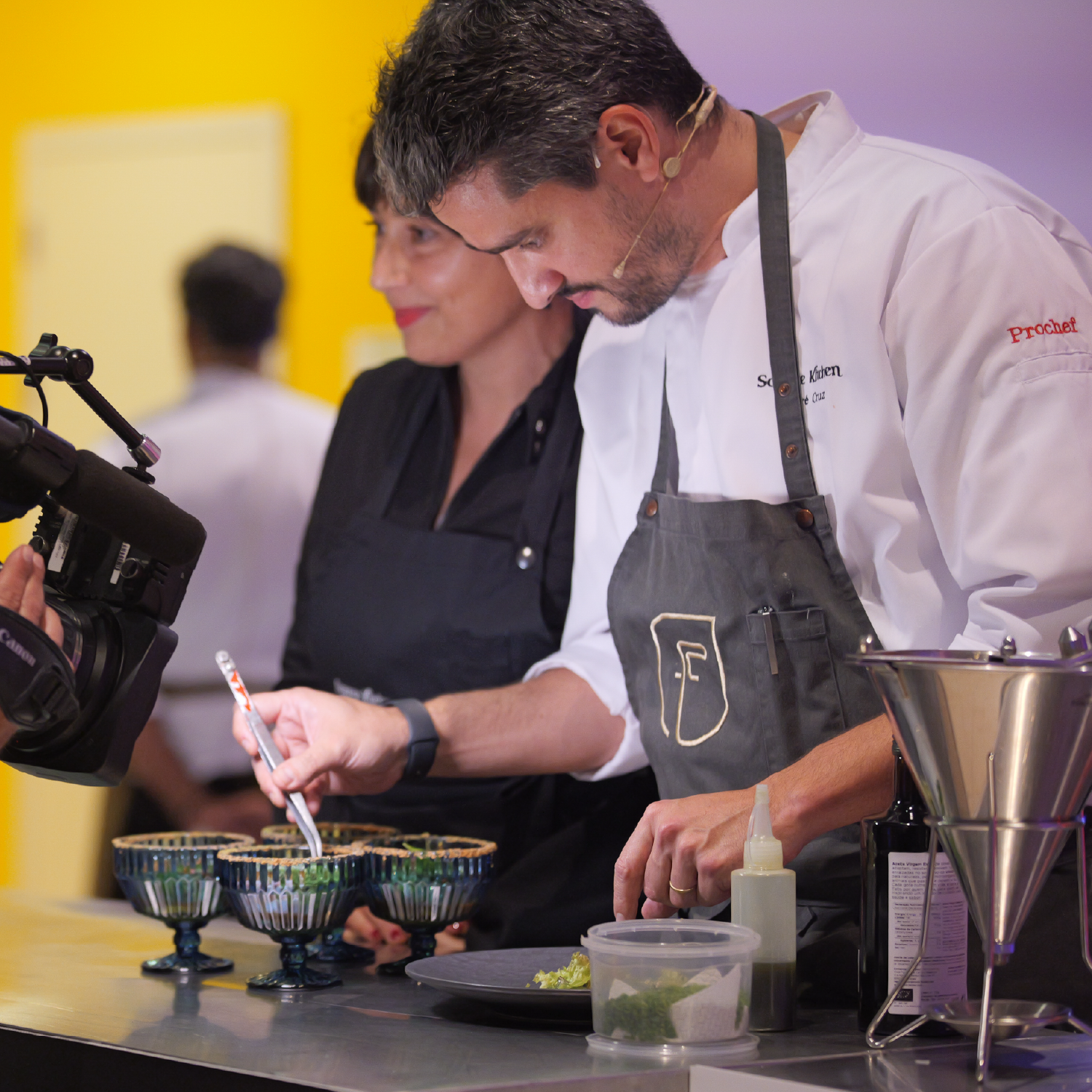14 November 2025
Where Science Met the Kitchen
Inside the first Science Kitchen at the Champalimaud Foundation.
14 November 2025
Inside the first Science Kitchen at the Champalimaud Foundation.

It was Friday evening, November 7th, and the entrance hall of the Champalimaud Centre for the Unknown didn’t look like itself. Where one would normally expect calm and quiet, the space pulsed with energy, the clinking of pots, the low hum of conversation, the scent of coriander, roasted pumpkin, and the promise of so much more.
Chefs in crisp whites stood shoulder to shoulder with scientists, tasting, talking, experimenting. Dishes were assembled like hypotheses tested, results shared not in graphs but in sensations. Guests gathered around, glass in hand, taking it all in. This was Science Kitchen, the moment where the world of research met the art of gastronomy, and where curiosity was not just observed, but tasted.
The spark for Science Kitchen came from a conversation between Carlos Ribeiro, Principal Investigator and Neuroscientist at the Champalimaud Foundation, and Paulo Amado, Founder of Edições do Gosto and one of the leading figures in Portugal’s culinary landscape.
Both share a belief that science and gastronomy are bound by a common thread: curiosity. Scientists and chefs alike work with the unknown, balancing precision with intuition, observation with creativity. Out of this shared vision, they imagined a project where these two worlds could meet, creating a space where scientific discovery and culinary imagination would merge.
Joana Lamego, Head of Strategic Research Development at the Champalimaud Foundation, joined the team early on alongside Carlos and Paulo.
With the vision of the Champalimaud Foundation’s Board of Directors - Dra. Leonor Beleza and Dr. João Silveira Botelho - Science Kitchen became the first chapter in this new story, one that perfectly reflects the spirit of creativity and innovation the Foundation cultivates.
Science Kitchen is an immersive dining experience that brings together researchers, chefs, and guests to explore how knowledge, creativity, and the senses can blend to create new forms of understanding.
At its heart, Science Kitchen is about dialogue, between taste and thought, the rational and the emotional, the scientist and the chef.
The journey began in February 2025, with a day of immersion. Four chefs visited the labs of four CF’s scientists, witnessing experiments and asking questions that went beyond recipes, protocols and reagents. Later, the scientists returned the visit, entering the chefs’ kitchens, observing technique give way to artistry.
These exchanges became collaborations, which then turned into dishes. Over months of reflection, experimentation, and tasting, each pair developed a course for the Science Kitchen dinner: a story told through ingredients, science, and imagination.
When Nobel Laureate Ardem Patapoutian visited the Champalimaud Foundation in May, the concept grew even deeper. His reflections on memory and sensation inspired new connections between flavour, perception, and discovery, all of which found their way onto the November menu.
Each duo - one scientist, one chef - crafted a dish that embodied their dialogue:
A vibrant combination of ingredients rich in omega-3s, collagen, vitamins, and antioxidants, the dish reflects Ana Luísa’s research on how diet can help the immune system control cancer metastasis. Chef David Jesus transformed this idea into “Coriander Acorn Pig Trotters”, a creation that is both nourishment and metaphor, a reminder that what we eat can change how we heal.
Guided by sensory impressions, Chef André Cruz and Scientist Eugenia Chiappe created a poetic exploration of intuition, curiosity, and movement. For Eugenia, who studies how animals move through space, and for André, who crafts harmony from nature, discovery begins before method, in noticing, feeling, and wondering. Their dish, Gold, Sea, and Fire, embodies this spirit: gold for knowledge, sea for the unknown, and fire for the spark of human curiosity.
Chef Marlene Vieira and Scientist Carlos Ribeiro share a fascination for texture, a sense that can define the pleasure of eating. United by humble roots in northern Portugal, they sought to transform simplicity into sophistication, creating “Inversão Textural”: a reimagined feijoada with cuttlefish and beans. Playing with firmness, softness, and aroma, they explored how texture, smell, and taste merge in the brain, a sensory and scientific reflection on memory, transformation, and creation.
Inspired by Albino J. Oliveira-Maia’s studies on how energy content shapes food preference, Chef Ana Patrícia Correia reversed the experiment: two desserts, identical in calories, but worlds apart in perception. A warm caramelised flan and a cool citrus mousse challenged guests’ expectations, revealing how our senses, experiences, and beliefs shape taste itself. It was a delicious illusion that proved a scientific point: taste is as much in the mind as on the tongue.
Guests, from business leaders and innovators to scientists and cultural figures, came together for an evening where curiosity guided every course and every interaction.
As each dish was served, the chef and scientist took the floor, sharing the story behind it: the question, the inspiration, the method. Guests listened to both culinary and scientific descriptions, as well as reflections on the attitudes and choices of those who create and prepare what we eat, and those who taste it. Glasses of Portuguese organic wine were raised, conversations flowed, and science was not only discussed, it was experienced.
In every sense, this was a new kind of experiment, one that didn’t end in scientific findings but in an open dialogue.
By the end of the night, a shared feeling lingered in the air: “We should do this again.” And so it will.

